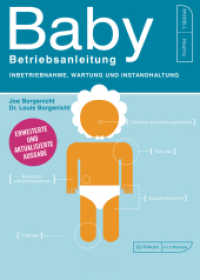- ホーム
- > 洋書
- > 英文書
- > History / World
Full Description
In this richly detailed history, Felix Jiménez Botta traces West German mobilization against human rights abuses in Latin America in the late twentieth century. Initially in the ascendant was a market-critical vision adopted by a loose, left-leaning coalition fighting against right-wing regimes seeking to destroy incipient welfare states and implant market fundamentalism. However, during the later 1970s-80s a market-friendly interpretation gained ground, emphasising negative civil and political rights at the expense of positive economic and social rights. Within these debates, the vocabulary of human rights was a malleable political language that served as a multidirectional point of reference for various actors from civil society, politics, and the churches. By analysing these opposing views of human rights, Jiménez Botta questions the revisionist interpretation of post-1970s human rights as an inherently conservative political and intellectual project. Instead, the triumph of market-friendly human rights in West Germany was contested, contingent and ultimately unfinished.
Contents
List of figures; Acknowledgements; Note on the text; Introduction; 1. Antifascism: the Chile solidarity movement in West Germany and the politics of emergency, 1973- 1976; 2. The politics of emergency in action: West Germany and the Latin American refugee crisis, 1973-1977; 3. Christian democratic solidarity: West German conservatives and the Chilean military regime, 1973-1980; 4. Quiet diplomacy: Argentina, Chile, and West Germany's technocratic response to grassroots human rights advocacy, 1975-1979; 5 . Politics of revolution: Nicaragua, El Salvador, and the rise of market-critical human rights in West Germany, 1977-1986; 6. Market-Friendly human rights: the neoconservative offensive on Central America, 1979-1986; 7. The politics of market-friendly democratization: West Germany and the end of military rule in the Southern Cone, 1980-1990; Epilogue; Bibliography; Index.








